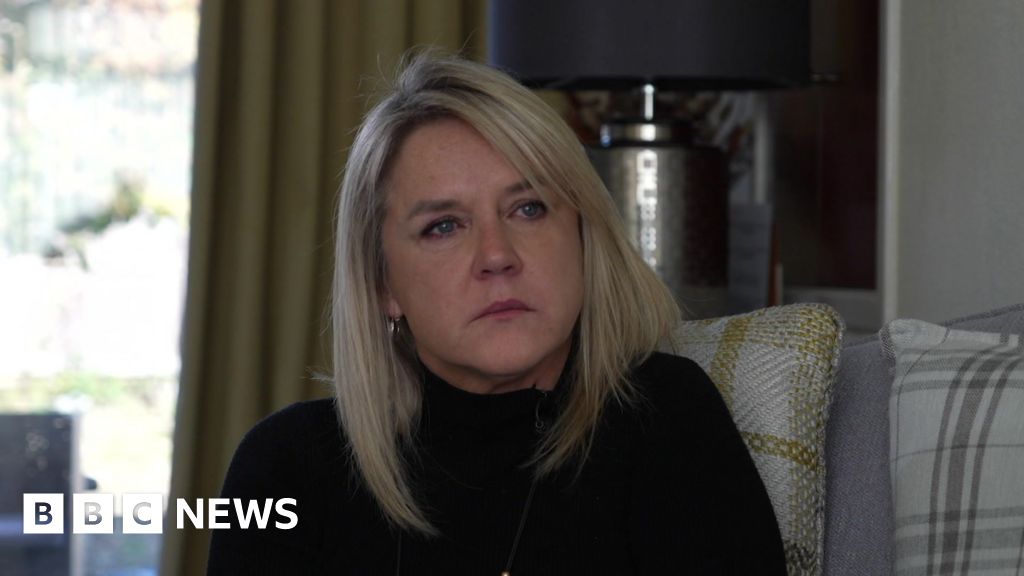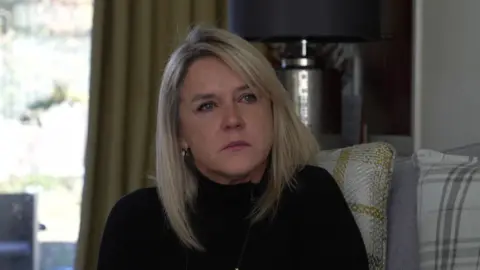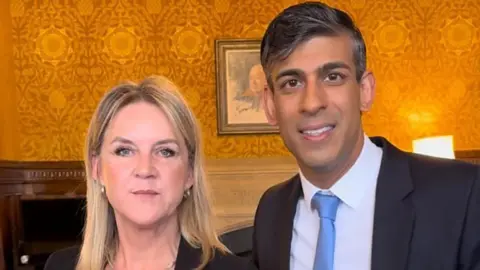Business
Disabled Post Office Horizon victim offered 15% of compensation claim

Emma SimpsonBusiness correspondent
 BBC
BBCA victim of the Post Office Horizon IT scandal who was temporarily paralysed after the stress of her ordeal has been offered 15% of her compensation claim.
Janet Skinner was wrongly convicted of false accounting in 2007 and sentenced to nine months in prison after the faulty software said £59,000 had gone missing from her branch account in Hull.
She has now received an offer of full financial redress – but it is a fraction of what she had claimed. “I cried and I cried… it’s trauma on top of trauma,” she told the BBC.
The government said it made every effort to make full and fair offers to all claimants.
But according to Ms Skinner’s lawyer, all the high-value complex claims are being fought “tooth and nail”.
“They’ve taken a particularly cruel approach to Janet’s case,” claims Simon Goldberg, from Simons Muirhead Burton.
The mother-of-two lost her home, her livelihood and served two months in prison.
A year after her release, she was back in the dock facing another jail sentence as the Post Office pursued her for failing to pay “proceeds of crime”.
Less than a fortnight after the matter was resolved, she suffered a neurological collapse, was paralysed from the neck down and used a wheelchair for a year.
“My immune system had broken down, basically my body attacked itself,” said Ms Skinner.
‘I’m in pain all the time’
It took her two years to learn how to walk again but she has been unable to work because of ongoing problems with her health and mobility issues.
“I’m in pain all the time. It’s changed my life completely,” she said.
She said she misses being able to spray her deodorant or hairspray because of the damage to her hands. Her son helps with visits to the bathroom and she often has to get down the stairs on her bottom.
Her conviction was quashed in 2021 but it has taken more than four and a half years to prepare her claim, including being asked to submit five medical reports.
A hearing took place earlier this year where, according to her legal team, the Post Office finally accepted these expert reports, which concluded her ill health had been triggered by the extreme stress that she had suffered.
The size of Ms Skinner’s claim has not been revealed, though it is very significant.
“The sticking points are almost every element of her claim,” said Mr Goldberg.
The biggest contested issues include her loss of earnings and future care costs.
The Department for Business and Trade recently took over responsibility for delivering redress for sub-postmasters whose convictions were overturned by the courts, including Ms Skinner’s case.
A spokesperson said it did not comment on individual cases, but that it took every effort to make full and fair offers. An independent dispute resolution process was available to all applicants who were not content with their offer, they said.
More than £1bn worth of compensation has already been paid out to more than 8,000 victims.
The bulk of these payouts has been in the form of uncontested fixed payouts, either £75,000 or £600,000 depending on the severity of the case.
 Janet Skinner
Janet SkinnerComplex claims are proving far harder to settle. Victims and their legal teams allege government and Post Office-appointed lawyers are dragging things out to minimise payouts – something ministers consistently deny.
“It’s not saving the public purse a penny. It’s actually costing the public purse in the medium term,” claims Ms Skinner’s lawyer, arguing that hundreds of millions of pounds have already been racked up in legal fees by big City law firms handling the claims, as well as legal fees paid to victims’ solicitors.
Mr Goldberg has written to Darren Jones MP, who he says was a champion of the wronged sub-postmasters while in opposition. He is now effectively the prime minister’s right hand man.
“The only way to resolve this is political pressure from the very top,” said Mr Goldberg.
Ms Skinner has already rejected her offer and says, if need be, she is prepared to go to court if she does not receive sufficient redress for everything that she’s been through.
Business
SoftBank reduces Ola Electric stake to 13.5% from 15.6% – The Times of India

BENGALURU: Masayoshi Son-led SoftBank Group pared its holding in Ola Electric Mobility to 13.5% from 15.6%, in what appears like a staggered exit from the electric 2-wheeler maker that was once among its marquee India bets. SVF II Ostrich (DE), a SoftBank affiliate and Ola Electric’s second-largest shareholder after founder Bhavish Aggarwal, sold 9.4 crore shares through open market transactions between Sept 3, 2025, and Jan 5, 2026, according to a regulatory filing.
Business
Government urged to make nutrition labels on front of food packaging mandatory

Nutrition labels on the front of food packaging should be made mandatory in the UK, according to a consumer champion.
Which? called on the Government to make the change amid what it described as an “obesity crisis”.
A “better approach” is needed to help people make healthier choices, it said.
It comes after research by the group found shoppers prefer traffic light labelling, although they said it could be improved with more prominent placing and increased size.
Traffic light labelling on food packaging was introduced in 2013 and uses green (low), amber (medium), and red (high) colours to show fat, saturated fat, sugar, and salt content, plus calories.
The system is not mandatory in the UK, although it is voluntarily used by major manufacturers and retailers.
However, according to Which? the system is used inconsistently.
It claims some shops do not include traffic light labelling, or provide it without colour coding.
Research by Which? captured insights through the mobile phones of more than 500 shoppers to find out how the traffic light system is working for customers.
A third (33%) said that the nutrition label was the first thing they looked at on the front of a pack.
People most used the traffic light system when choosing snacks (56%), dairy products (33%) and breakfast cereals (27%).
Almost half (47%) said they found this labelling easy to understand.
In focus groups, the traffic light system was the preferred food labelling option, although suggestions to improve it included making it more prominent and larger.
Which? said that people also called for making the scheme easier to understand, such as making the recommended serving size on some products more realistic and consistent.
The consumer champion is now calling on the Government to introduce a mandatory front-of-pack nutrition labelling scheme.
It said this could build on the existing traffic light system to make it work better for shoppers by bolstering consistency, making it more prominent and removing aspects people may find confusing.
Sue Davies, head of food policy at Which?, said: “The UK is in the midst of an obesity crisis and it’s clear that a better approach to front-of-pack labelling is needed to help shoppers make healthier choices.
“Which? is calling on the Government to ensure that all manufacturers and retailers use front of pack nutrition labelling, ideally by making this mandatory.
“Our research shows that people still prefer traffic light nutrition labelling, but that the current scheme needs updating so that it is clearer and simpler and works better for consumers.
“The new system should be backed up with effective enforcement and oversight by the Food Standards Agency and Food Standards Scotland, so shoppers have full trust in the labels on their food.”
In 2022, some 64% of adults in England were estimated to be overweight or living with obesity.
In November it also emerged that one in 10 children in the first year of primary school in England is obese, the highest figure on record outside the pandemic.
It is estimated that obesity costs the NHS more than £11 billion every year.
A Department of Health and Social Care spokesperson said: “This Government is bringing in a modernised food nutrient scoring system to reduce obesity.
“It’s just one element of the strong action we are taking to tackle the obesity crisis as part of our 10 Year Health Plan, which will shift the focus from sickness to prevention.
“We are also restricting advertising of junk food on TV and online, limiting volume price promotions on less healthy foods and introducing mandatory reporting on sales of healthy food.”
Andrea Martinez-Inchausti, assistant director of food at the British Retail Consortium, said: “Retailers have led the way in nutrition labelling, consistently providing advice on healthy living.
“Whether that be through the traffic light system, or other measures, the industry is fully committed to helping improve the health of their customers and are constantly looking for what will work best for them.”
Business
How IMAX crushed other theater stocks in 2025

An Imax private screening for the movie “First Man” at an AMC theater in New York on Oct. 10, 2018.
Lars Niki | Getty Images Entertainment | Getty Images
The theatrical industry is in flux — and one stock is rising above the rest.
Imax saw its shares jump more than 44% in 2025, even before the company announced that it had generated a record $1.28 billion at the global box office for the year. Those ticket sales marked a more than 40% increase over 2024 and were 13% higher than its previous record set in 2019.
Meanwhile, shares of fellow theatrical stocks AMC, Cinemark and Marcus Theatres cratered in 2025. AMC was down more than 60%, Cinemark’s stock fell 25% and Marcus Corp., which operates theaters and hotel chains, slumped around 28%.
The sharp declines on Wall Street come as theater operators struggle to grapple with massive changes in the industry.
Domestic ticket sales have rebounded from the record lows posted during the Covid pandemic, but remain about 25% below the the record-breaking $11.8 billion collected in 2018. The 2025 box office fell short of the $9 billion analysts had projected heading into the year, signaling to industry watchdogs that post-pandemic hurdles could be more permanent than anticipated.
“In an environment where consumer spending headwinds and economic concerns forced consumers to be choiceful with their entertainment spending, streaming services continue to represent an attractive option,” Eric Wold, executive director of equity research at Texas Capital Securities, told CNBC.
At the same time that consumer habits have shifted toward the home entertainment market, Hollywood is producing fewer films.
A combination of Wall Street penny-pinching, studio mergers and lingering production shutdowns from the pandemic and dual labor strikes has led to a significant drop-off in the number of movies hitting theaters.
“I think investors are still struggling with, and frankly, what everyone within the industry is still trying to figure out is, what is the real new normal for box office?” said Robert Fishman, senior research analyst at MoffettNathanson.
The winnowing of theatrical has left Imax ahead of the pack.
Move toward premium
When the theatrical slate is thin, Imax benefits, because when moviegoers do decide to leave their couches they are opting more and more for premium large format experiences.
In 2025, more than 16% of tickets sold for domestic showtimes were for these types of theaters, according to data from EntTelligence. That’s up from 15% in 2024 and 13.8% in 2023.
Often called PLFs, premium large format auditoriums are considered an elevated viewing experience, with bigger screens and higher-quality sound systems and seating options — and they come with higher ticket prices.
In 2025, general movie tickets averaged $13.29 apiece, while PLF tickets went for around $17.65 each, EntTelligence data showed. For comparison, premium tickets in 2024 averaged around $16.88 apiece.
As Hollywood shifts toward producing more big-budget blockbuster features — while medium-to-low-budget films are more often sent to streaming — PLF screens will become increasingly important.
After all, the films that benefit the most from PLF ticket sales have been Hollywood’s biggest releases, as audiences want to see explosive action movies and dazzling spectacles in the most state-of-the-art locations.
ScreenX is the world’s first multi-projection cinema with an immersive 270 degree field of view.
CJ 4DPLEX
On the docket for 2026 is Disney’s “Star Wars: The Mandalorian and Grogu,” Universal and Christopher Nolan’s “The Odyssey,” Netflix and Greta Gerwig’s “Narnia” and Warner Bros. and Denis Villeneuve’s “Dune: Part Three.”
All of these films were shot with Imax film cameras and will have theatrical releases on Imax screens.
The company has forecast its 2026 global box office haul at a new record of $1.4 billion.
“We see no signs of slowing down given a very promising slate ahead and the consistency of our market share gains, as filmmakers, studios, and audiences worldwide continue to gravitate toward the Imax experience,” said Rich Gelfond, CEO of Imax, in a statement Wednesday.
As of the end of September, Imax had more than 1,700 locations and a backlog of 478 contracts to build Imax screens. Notably, Imax screens represent less than 1% of the total movie screens worldwide.
Putting up profits
AMC, Cinemark and Marcus all have premium large format movie screens as part of their suite of theaters as well and have invested in creating more of these spaces in their cinemas.
But the chains are playing a game of catch-up.
AMC, in addition to its existing partnership with Imax, has plans to add more Dolby Cinema theaters to its U.S.-based locations as well as Screen X and 4DX auditoriums globally. Cinemark, too, made investments in the last year to add more Screen X theaters to its portfolio.
Of course, these upgrades can be expensive. In the case of AMC, renovations prior to the pandemic saddled the company with billions in debt, which was exacerbated during Covid-related shutdowns. The company is still dealing with this debt load.
Working in Imax’s favor is the fact that the company is notably asset-light, meaning it has minimized its ownership of physical assets like buildings by leveraging its technology and partnering with other companies.
Instead of costly real estate leases, Imax makes deals with cinema chains to install its equipment into their auditoriums and then takes a share of the box office receipts for films screened in those theaters.
AMC, Cinemark, Marcus and other theater operators, on the other hand, have the financial burden of rent and utility payments, which are only partially offset by ticket sales that they split with studios. Concessions — popcorn, soda and specialty food — have become the means for these businesses to drum up enough funds to cover expenses.
But, if the production slate isn’t strong and cinemas don’t have enough content to draw in moviegoers, then profitability is at risk.
In the first quarter of 2025, all three cinema stocks posted net losses. Marcus and Cinemark rebounded to profitability in the second and third quarter, as the calendar of films improved, while AMC posted two more periods in the red.
Imax, on the other hand, was profitable in all three quarters. Through the first nine months of 2025, Imax reported net income of $43 million, up 67% from the same period in 2024.
The theater stocks will all report fourth-quarter results in the coming weeks as earnings reports roll out.
-

 Entertainment2 days ago
Entertainment2 days agoDoes new US food pyramid put too much steak on your plate?
-

 Politics2 days ago
Politics2 days agoUK says provided assistance in US-led tanker seizure
-

 Sports5 days ago
Sports5 days agoVAR review: Why was Wirtz onside in Premier League, offside in Europe?
-

 Politics5 days ago
Politics5 days agoChina’s birth-rate push sputters as couples stay child-free
-

 Entertainment2 days ago
Entertainment2 days agoWhy did Nick Reiner’s lawyer Alan Jackson withdraw from case?
-

 Entertainment5 days ago
Entertainment5 days agoMinnesota Governor Tim Walz to drop out of 2026 race, official confirmation expected soon
-

 Sports5 days ago
Sports5 days agoSteelers escape Ravens’ late push, win AFC North title
-

 Business5 days ago
Business5 days agoAldi’s Christmas sales rise to £1.65bn





